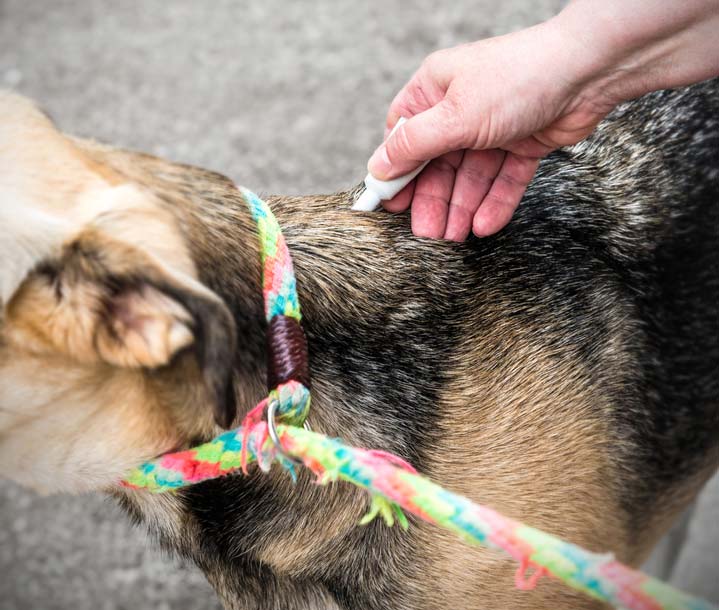Which Insect Repellants Are Safe for Your Dog?

Mosquitos, fleas, and ticks can carry illnesses like heartworm disease, Lyme disease, Rocky Mountain spotted fever, and more and spread them between dogs and sometimes humans. Fleas can also trigger allergies in dogs. Understandably, people are concerned about making sure their dogs are protected from mosquito and tick bites, but there is also concern about which repellents are safe to use on dogs. Here are some things to keep in mind.
Minimize Your Dog's Exposure to Pests
One thing you can do to help protect your dog from insects is to think about decreasing their exposure to the pests.
- Avoid allowing your dog to run through tall grass, wood piles, and dense brush where ticks like to reside.
- Keep your dog inside during peak mosquito times like the twilight hours. If there is any standing water on your property that can be a breeding area for mosquitoes, remove it.
- Keep your dog on the trails when you're hiking in the woods because ticks are more likely to be in the brushy areas than on clear paths.
Additionally, when you bring your dog in from outside, make a habit of checking for ticks. Those that are embedded, you can remove right away, and those that might be hitch-hiking in on your dog's fur, to be dropped and later attach to you or one of your family members can be found and destroyed before they can do so.
Using a flea comb on your dog when he comes in from outside can help you find ticks and also help reveal fleas and flea dirt.
Use Canine Safe Repellents
When dealing with fleas, ticks, and mosquitoes on your dog, it's best to focus on repellents rather than treatments. Killing or keeping a biting insect away before it can transmit disease or trigger an allergy is preferred over killing the insect after it has bitten.
You can find insect repellents in the store, at your veterinarian's office, or you can make them yourself. Of these, the safest and most effective are those provided by your veterinarian. Not only are those products more rigorously tested, but they also come with a veterinarian's expertise and recommendation.
Human products containing DEET can be toxic to dogs, who tend to lick off what we put on them. Avoid using human repellents on your dog, and don't let your dog lick you when you have such products on.
There are many different repellents, along with heartworm preventatives, and each one is best in different circumstances and for pets with certain medical conditions or that are on other medications. Only your veterinarian can effectively consider all of that information, put it together with your dog's individual lifestyle and the diseases prevalent in your geographic area, and recommend the safest product or products that are most likely to protect your dog the best.
Not only is using veterinarian recommended repellents and preventatives safest for your dog, but it is also safest for your human family. A good pest management program decreases your family's risk of being bitten by insects brought in by your dog and potentially being exposed to disease conditions they are carrying.
You May Also Like These Articles:
Apple Cider Vinegar as Flea Control for Dogs
Tips for Finding Fleas on Your Dog: VIDEO from VetVid
Animated Heartworm Video by Bayer: VIDEO
4 Tips to Avoid Getting Intestinal Parasites from Your Dog
Disclaimer: This website is not intended to replace professional consultation, diagnosis, or treatment by a licensed veterinarian. If you require any veterinary related advice, contact your veterinarian promptly. Information at DogHealth.com is exclusively of a general reference nature. Do not disregard veterinary advice or delay treatment as a result of accessing information at this site. Just Answer is an external service not affiliated with DogHealth.com.


